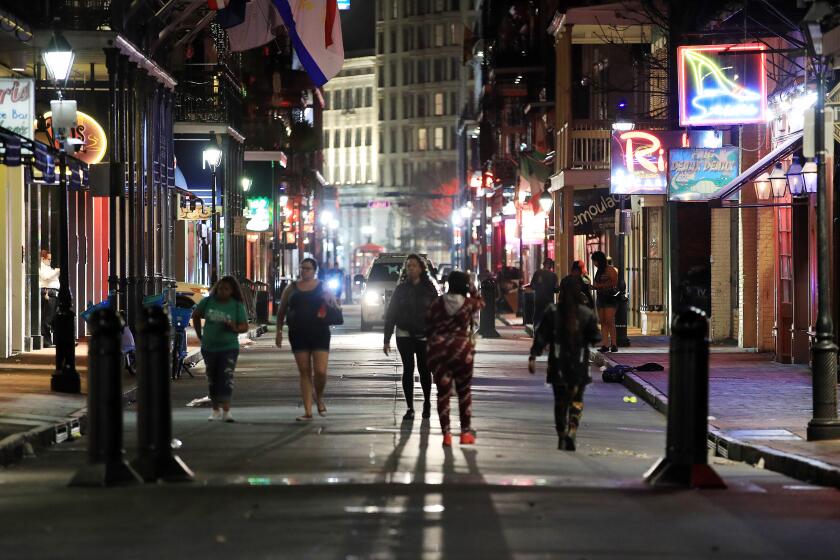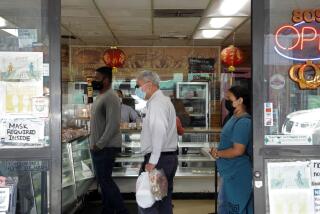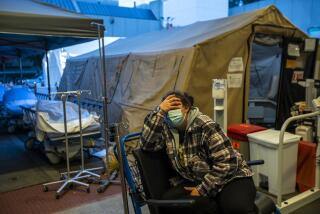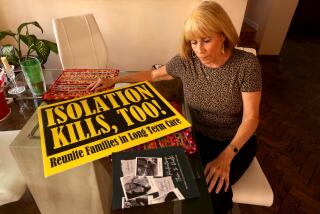In Louisiana, death comes before coronavirus test results
NEW ORLEANS — Social worker Natasha Ott was feeling ill but declined a COVID-19 test earlier this month because her clinic, Crescent Care — which serves the HIV-positive community — only had five, and she wanted to save them for patients.
“They don’t think I need to get tested unless I develop a fever,” the 39-year-old texted her boyfriend, Josh Anderson. “All looks well.”
Ott, a Claremont native who moved to New Orleans five years ago, was finally tested a week later, on March 16. She was told she would have to wait for the results. Anderson offered to bring her pho, but she said she didn’t have an appetite. She was tired, and asked him to walk her dog, Zola.
Two days later, she texted: “I just don’t understand why I don’t feel much better yet.” Two days after that, Anderson found her collapsed in her kitchen, dead.
“She died on the day she was supposed to get the results,” said family friend Carol Coalson, of San Diego, Ott’s foster mother, who had just visited her last month to celebrate Mardi Gras.
Two weeks after the first COVID-19 case was reported in Louisiana, the coronavirus is spreading fast, infecting more people per capita than in California, so far killing at least 46. The virus has spread to two-thirds of the state’s parishes.
“We have the fastest growth rate of confirmed cases in the world,” Gov. John Bel Edwards said this week. “There’s no reason to believe we won’t be the next Italy.”
Edwards ordered residents to stay home as of Monday night and said projections showed the state could run out of healthcare capacity within a week. He canceled elective surgical procedures and said the state was trying to add 200 intensive care beds as soon as possible.
“Nobody knows how long this is going to last,” Edwards said, “but we do know right now Louisiana’s trajectory threatens our ability to deliver care.”
New Orleans is the epicenter of the state’s outbreak. Lambeth House, a local nursing home, reported 24 cases and seven deaths. The National Guard has set up medical tents outside Charity Hospital, shuttered since Hurricane Katrina. Doctors and nurses who reopened the city’s other hospitals after Katrina are facing a new challenge: medical shortages. They’re reusing surgical masks and isolating groups of potentially contagious patients in special wards as they wait days for test results. Tests are scarce, and those who are tested wait days for test results.
Ott, a graduate of UC Santa Cruz, moved to New Orleans five years ago after earning her master’s in social work at San Francisco State and serving in the Peace Corps in Togo.
She didn’t have any underlying conditions, had told Anderson that she was feeling better, and was working from home when she last texted Coalson on Friday afternoon.
“She didn’t say anything about her symptoms getting worse,” Coalson said.
Ott also texted Anderson, who asked how she felt. She replied, “A little better and hopeful.”
That was her last message.
When she failed to respond to his texts and calls, Anderson came to her house and found her unresponsive.
“Seeing a woman I knew to be so full of life lying on the floor lifeless was devastating,” he later wrote on Facebook. “I was afraid to touch her. I held her anyway.”
Ott’s first COVID-19 test came back negative, said her foster sister, Emily Coalson Stamets, but her doctor had the lab retest “because he is highly skeptical of the results,” and the family could have results in two days. The New Orleans coroner’s office is also conducting its own test, which could take up to 90 days, a spokesman said.
Anderson, who cared for Ott when she was sick, has not qualified for testing yet because he does not have symptoms, a requirement at local testing centers, so he has self-quarantined, Coalson said.
Coalson was troubled by the limited coronavirus testing in New Orleans.
“If we’re not testing people who have been exposed, how do we know how many people have the disease?” she said.
Stamets said she wished Ott could have received her test results sooner.
“If she knew she had positive results,” she said, “she might have sought treatment.”
Last week, Michael Bell, 60, felt feverish and tried to get tested at a hospital on the city’s east side but was told the only testing site was across town at West Jefferson Medical Center.
Bell, a disabled construction worker with emphysema, didn’t feel up to the drive.
“If my lungs start to get messed up, I’ll go out there,” he said as he sat outside the hospital wearing a surgical mask.
The same day, Michael Warner pulled up in his truck to the drive-through testing tent outside West Jefferson.
Warner, 36, who works for the state transportation department, said a co-worker had become ill the week before, then Warner developed a fever.
“They said he didn’t have it — it was walking pneumonia, “ not COVID-19, Warner said of his co-worker. But a week later, “they tested him again and he tested positive.”
Warner’s wife, who works at Ochsner Baptist medical center in New Orleans, didn’t have symptoms of the virus but had been checking her temperature, he said. As of Sunday, he hadn’t received his test results.
Louisiana’s governor forced historic bars and restaurants to close this week, leaving many unsure when — or if — they will reopen.
Some New Orleans doctors said they were concerned about delays in COVID-19 testing.
“We haven’t been able to get results for five days, and in some cases the state loses the tests,” said New Orleans Dr. William Lacourt. “They’re running through all the personal protective equipment when they don’t need to. The doctors making necessary decisions have got to have rapid testing. If we can get this done in 45 minutes, we can make decisions. Right now, it’s like we’re swimming in a pond blind.”
Lacourt said he knew a nurse practitioner at Ochsner who went to work with a fever Saturday and was sent home, only to be told when she returned the next day that she had to be tested for COVID-19. She still hasn’t been tested, he said.
“The better approach would be: Before we send you home, we’re testing you,” Lacourt said. “The people on the front lines need to be able to make decisions and adapt. That’s what we did in Katrina.”
He said the 80-year-old parents of one of his son’s friends tested positive for COVID-19 after visiting a resident at Lambeth House.
“I talked to the father and he was recovering,” he said, “but the mother couldn’t get hold of her doctor and was short of breath.”
Lacourt told her to go to the emergency room. She declined. He happened to have some hydroxychloroquine — anti-malarial pills, considered a possible treatment for COVID-19 — so that’s what he offered them.
“I put them in a cup 10 feet in front of their door; he came and picked it up. I presume he gave it to his wife,” Lacourt said.
He has worried in recent days about whether New Orleans doctors will be forced to ration protective gear as well as medical care, prioritizing some sick patients for treatment over others, as some healthcare workers were accused of doing after Katrina.
It was at Memorial Medical Center (now Ochsner) that Dr. Anna Pou and two nurses were arrested, accused of murdering four patients during the 2005 storm. The patients had received lethal doses of morphine, although charges against the nurses were dropped and a grand jury refused to indict the doctor.
One of the people who died was Lacourt’s patient.
“I was out for blood until I realized ... a disorganized corporate system” was to blame for the deaths, he said. “I ended up writing an affidavit for her attorney saying it wasn’t her fault. She was put in that position by the state.”
Pou and the nurses were among a group of medical personnel who stayed at the hospital through the storm. The facility lost power and was inundated with 10 feet of water after the hurricane.
Lacourt worries doctors will soon be put in the same position Pou was by the state, forced to ration care according to “the old Memorial playbook.”
An employee at a New Orleans hospital who asked not to be identified because he wasn’t authorized to speak on the matter said the staff was treating scores of COVID-19 patients, at least a dozen of them in critical condition and on ventilators, and faced shortages of protective masks, face shields and gowns.
“We’re reusing masks for different patients, for different days. People are essentially being issued one mask and face shield for the day,” he said.
He said hospital staff sent those who had been tested for the virus to special wards or floors, where they might spend a week awaiting results.
In recent years, the city and state slashed public health budgets and closed clinics that could have helped test and treat those with COVID-19, said Dr. Brobson Lutz, former director of the New Orleans Health Department.
“They’re operating at a budget of about 10% of what we had 15 years ago,” he said. “This week, we will see what happens as serious cases come to the forefront challenging our hospital system.”
Although Louisiana has more hospital beds per capita than other states, Lutz says many of those beds have been devoted to profit-generating care such as elective procedures. The result: Hospitals actually have less ability to expand emergency beds than they did before Katrina, he said.
Lutz said it’s probably too late to slow the virus’ spread in Louisiana. He likened the governor’s stay-at-home order this week to New Orleans leaders firing cannons and lighting tar pots to fight yellow fever in the 1800s.
“Is it really going to make a difference, especially in an area such as New Orleans where it is quite likely more than 50% of our population has already been infected?” he said.
Older New Orleans residents worry about access to care during the pandemic, especially those in areas like the Ninth Ward and New Orleans East that were hard hit by Katrina, said the Rev. Fred Luter, who rebuilt and moved his Franklin Avenue Baptist Church there after the storm. Last week, he hosted a doctor at the church who answered questions from church members via livestream video.
In the absence of widespread COVID-19 testing and rapid test results, Anderson urged people to seek care for loved ones immediately, as he wished he had for Ott.
“She told me on Thursday evening that she felt like something was in her lungs,” Anderson wrote on Facebook on Sunday. “If you or a loved one feel like there’s fluid or congestion in their lungs or is experiencing shallow breathing, seek medical attention immediately. Don’t wait on a test status, don’t wait to see if things will feel better tomorrow.”
More to Read
Updates
3:01 p.m. March 27, 2020: A New Orleans social worker who died before she received her COVID-19 test results has tested negative for the virus, authorities said Friday.
Natasha Ott, 39, died suddenly March 20 after feeling sick but initially forgoing testing because of the limited supply of test kits.
After she died, relatives said they received results of the COVID-19 test Ott had taken while she was still alive, which was negative. Her doctor requested a second test posthumously, which was also negative, said Jason Melancon, a spokesman for the New Orleans coroner’s office.
Ott’s cause of death was still under investigation Friday, Melancon said.
Sign up for Essential California
The most important California stories and recommendations in your inbox every morning.
You may occasionally receive promotional content from the Los Angeles Times.












